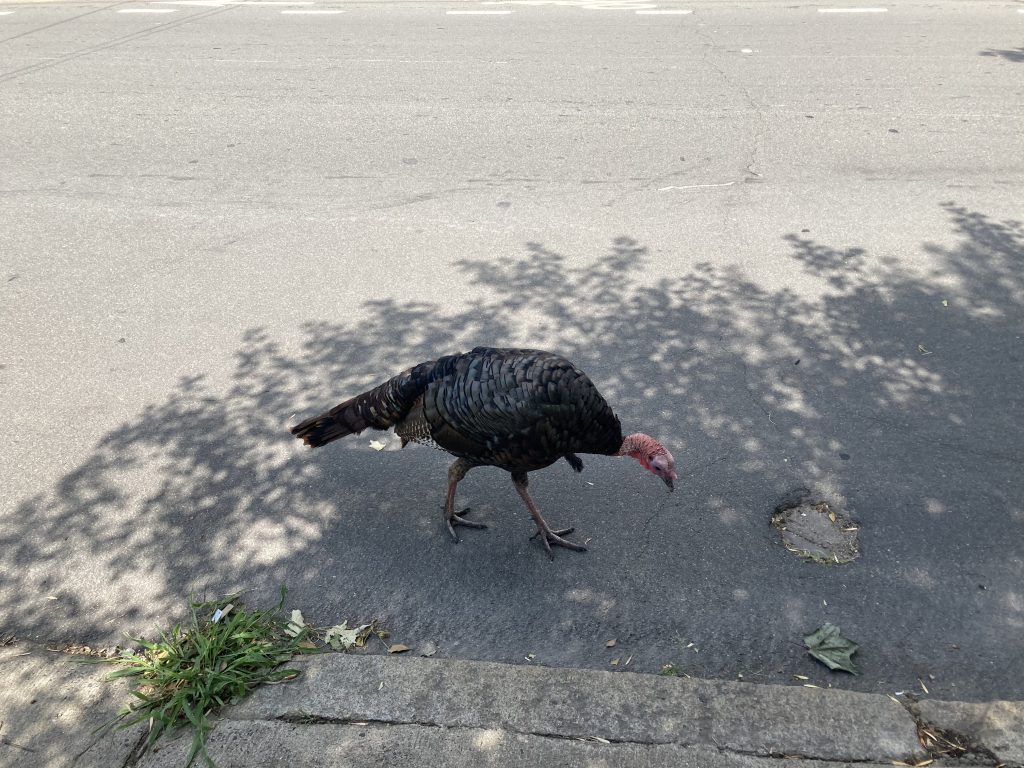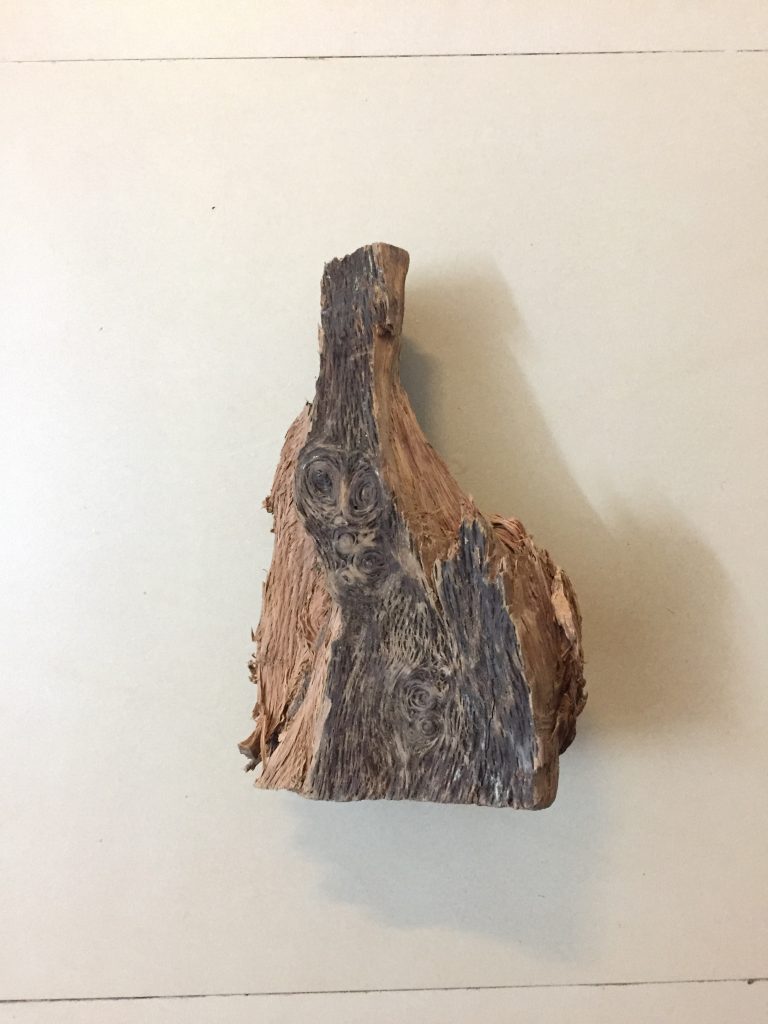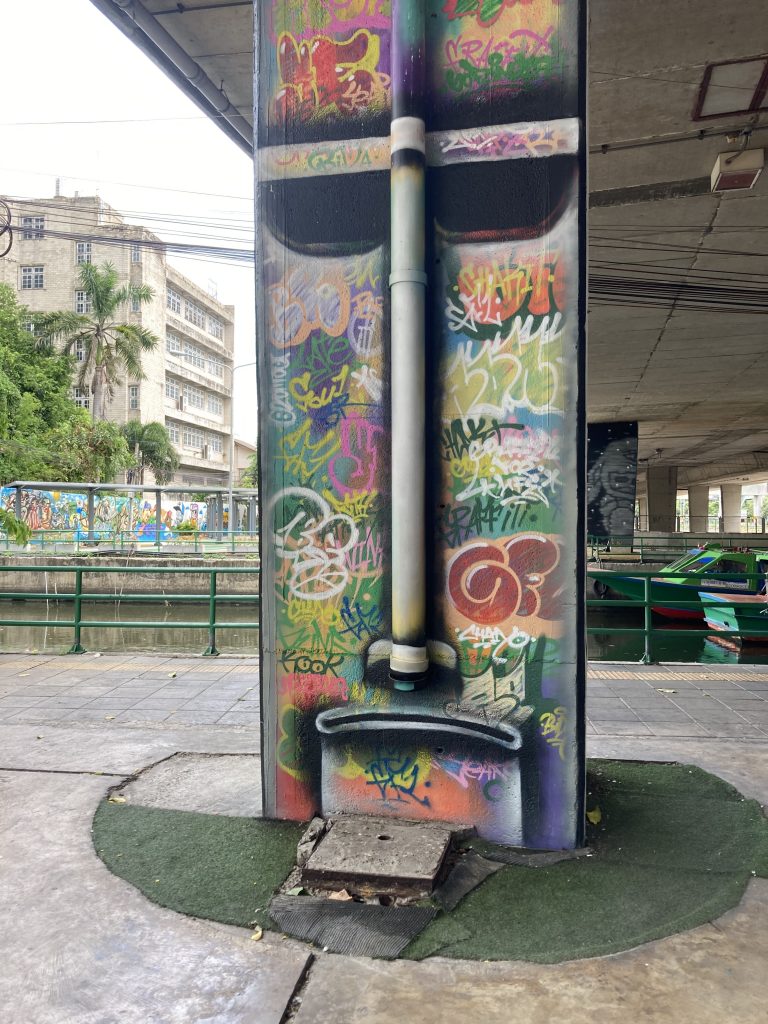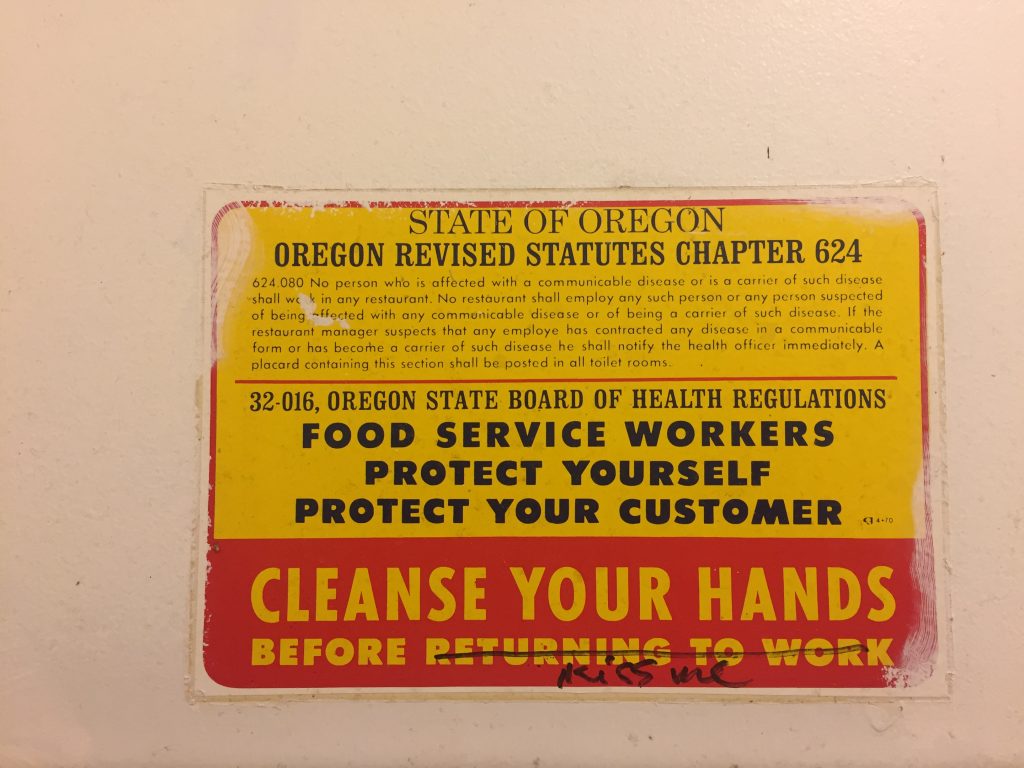howdy doody

The traveler explores the American Wayside, verifying the contents of a mysterious guide written by a man with whom he shares a likeness and name. Excerpts from ‘Autumn by the Wayside: A Guide to America’s Shitholes’ are italicized. Traveler commentary is written in plain text.

A bridge spans the center of ‘Crater or Maybe Volcano State Park’ in New Mexico, rickety, as most walking bridges seem, but also newish, given the park’s recent opening. The state of the bridge after so little use reiterates the confident flippancy of the name and I’m loathe to risk crossing it with Hector, in case we fall, or without, in which case he likely starves in the kennel on the back of the bike (or fossilizes for all I know). There are a great number of questionable things being done under the current government and the trust I may have once had, the trust that would make me think the bridge was built stronger than it seems, has long dried up. We content ourselves with a walk around the brim as a much braver couple makes the crossing, their nervous laughter reaching our ears when the wind is just right.
‘It seems likely that the budget for ‘Crater or Maybe Volcano State Park’ fell through some time between its proposal and its ‘completion’ but that certain funds had already been granted and were too tedious to return. The result is a total of three benches, placed around a natural pit, a bridge to cross it, and a handful of signs indicating that there are no handrails (whether they were simply too expensive to install remains unsaid).
The informational signs are printouts stapled to repurposed cardboard and they are purely speculative, reading like a stilted argument between two Rangers, one of whom has been assigned to argue that the pit is definitely the impact site of some ancient meteor and one whose educated guess is that it is ancient, yes, but terrestrial in nature.
The ‘Crater or Maybe Volcano State Park’ invites visitors to weigh in on the debate at every turn. The insistence is endearing, at first, but increasingly desperate as each new sign attempts to crowdsource the geological information required to properly name the site. A cement post near the exit suggests the aborted foundation for a donation box that was never funded in full.’
Hector and I are a quarter of the way around the rim when the bridge breaks and the couple disappears into the crater or maybe volcano. We might not have noticed the screaming if the wind hadn’t been just right. I gather Hector and we rush back toward the entrance where I seemed to have a bar or two of cell service. In the time it takes us to reach, someone else has made the call. A helicopter performs skeptical loops above the pit while those of us in the parking lot give statements. I have my helmet on before the local news starts interviewing but I worry I may show up in some of the background shots.
It’s hard to know how quickly a thing can end for a small mistake.
-traveler

‘We’re looking for people like YOU!’
Billboards tend to blur in the peripheries until I’m checking for a likely lunch spot or the rare Shitholes destination that advertises outside of the book. I could have driven past a number of these before noting anything that seemed… strange.
‘Are you between the ages of 18 and 64? We’re looking for people like YOU!’
‘We’re looking!’
‘We’re looking for PEOPLE!’
‘Are you between the ages? We’re looking for people like YOU!’
No phone numbers on these signs. Just a general declaration of what the advertiser is looking for. I stop to look it up but the only hits are people, like me, who are trying to figure out what the story is. I add my findings to a couple forums for posterity and pull back onto the highway.
‘We are looking for PEOPLE!”
‘We are looking for YOU!”
Just before Hector and I make it to our exit I see a much larger version of the same sign, flickering with halogen bulbs and propped up on two stilts, precariously tall. An arrow points from ‘We’ to a dim warehouse below the sign. An arrow drawn from ‘YOU’ indicates my general location on the highway.
I stop again and flip through Shitholes, nervous in the untrodden dark. No entry indicates any knowledge of these signs or of the warehouse to which they seem to lead. Ahead, the sign pulses with a heat mirage, swarms with moth-hunting bats and bat-hunting bigger-things that swoop heavily on the edge of the light.
We exit early, content to let that one pass. The compulsion to seek out mystery in the face of danger has faded, in me, at long last.
-traveler

‘A great deal of speculation seems to have gone into ‘The Collected Warnings About Hitchhikers.’ For each story with the backing of an actual headline, there are three or four that have clearly arrived at the museum by word of mouth and this practice is all but confirmed by a book near the exit in which visitors are asked to log their own hitchhiker horror stories. An astute traveler might notice the many redacted entries inside, stories which, no doubt, recall positive interactions between strangers on the road. These anecdotes are not welcome in the museum. The owner makes that very clear.
Esteban Cooke broke ground on ‘The Collected Warnings About Hitchhikers’ shortly after his 16 year old son ran away from home. Steven Cooke was the last of his five children, each of whom disappeared into the Wayside around the same age and each of whom followed in the footsteps of their mother, Luciana Cooke. Their stories are made public in the museum itself, their likenesses recreated in scarecrow structures wearing (one must assume) the clothes they left behind and each smiling or grimacing through a wax ball that Esteban estimates is near enough to a bust. The figures shift and twitch with the help of rudimentary robotics while they explain (through Esteban’s falsetto) their tragic fate on the road. Whether he means to or not, Esteban allows an amount of mocking into these performances.
Most other exhibits reiterate your ‘Resurrection Marys’ and your ‘Hook-Handed Slashers,’ claiming that similar incidents have been reported in every state, along every road, and ‘are written in scar tissue on the hearts of those left behind.’ A renovation set to become ‘a gruesome series of hitchhiking murder scenes in 3D’ has been in process for the better part of a decade.
The only section that seems to differ notably from the major contents of the museum is a wing that details a mysteriously-sourced translation of ‘Hitchhiker’s Thumb,’ a coded language that the museum takes very seriously. The exposé hinges upon the idea that hitchhikers are universally versed in this language and honor-bound to declare their intentions before entering a vehicle. A thumb leaning forward, for instance, is a signal that the hitchhiker means to murder a driver for their car (the forward lean a suggestion that they only kill as a means to an end). A thumb leaning back indicates a killer-for-fun with a specialty in ducking behind the driver’s seat and leaping out to strangle their host (the leaned-back thumb representing the struggling victim). Movement of the thumb at any point can foreshadow the inevitable killing in a number of ways- the swiftness with which the thumb is dropped can be scaled to understand the patience of the murderer, the waggling of a thumb might suggest torture preceding death.
The number of ways Esteban Cooke has imagined the murder of his family on the road is astounding. One leaves ‘The Collected Warnings About Hitchhikers’ feeling as though they’ve glimpsed a man’s embarrassing fetish and harboring pity for his lost family, not swayed by the stories of their demise, but by the understanding that they had to live with its owner.
-an excerpt, Autumn by the Wayside

The horizon has begun to straddle terminal dusk behind me when a second star bursts into view ahead, so bright that I pull over and wait for my vision to clear. It clears after the sun has set and leaves only a confusion of neon lights, a rogue LED flashing sickly in the encroaching high-definition dark. By then I’ve checked my phone and confirmed that this is likely my destination.
‘For the sake of brevity, this entry will refer to ‘The American ‘American Diner’ Diner’ as ‘TAADD’ except for when it counts. When it counts is now, because it is important to understand that, by embedding ‘American Diner’ into ‘The American Diner’ ‘The American ‘American Diner’ Diner’ is doubling down on a stereotype so well-trodden that the finished product borders upon absurdity that turns the stomach.
‘TAADD’s’ outer is plated in chrome and polished to such a shine that the 50’s era curving structure reflects with the blasphemous irreverence of a carnival mirror. To approach ‘TAADD’ is to be confronted with battalion of strutting selves, some short and stubby, others spindly and looming like a beetle-sick pine.
Inside one can expect to be ignored entirely or set upon by servers so weathered and wry that their nonchalance becomes cutting. Cutting, too, are the cracks in the plastic booths which open and close like tiny mouths as one shifts their weight, nipping at exposed flesh and confirming a millennium’s filth in the cushions. The food is mainly grease and salt, the coffee, hot tar. The smoking section may well be on fire and everything has been tooth-picked to the surface beneath it. ‘TAADD’ is the diner experience as it’s meant to be- the only option available.’
My evening arrival spares me the existential confrontation by warped reflections but my attempts to enter ‘TAADD’ are fruitless for the better part of an hour as the reflected scrawl of a dozen neon signs weaves mirages where a door should be. Hector is eventually hungry enough that he opts to use his blindness to our advantage and, with his slow tugging as guide, we eventually arrive on the other side of this rainbow maze.
A sign past the door says ‘Please Wait to Be Seated’ on one side and ‘Please Seat Yourself’ on the other and is positioned such that it’s difficult to know which is the current intended takeaway. I let Hector cross onto the carpet first, like a bumbling mine canary, and his trespass goes without comment. We slide into a booth near the front and are awarded with laminate menus.
All of the items up for grab are listed without description and personalized in such a way as to be entirely mysterious. ‘Ezekiel’s Smoked Salad.’ ‘Liza Plate (sm).’ ‘Inverted Pancakes (Choose Maria or Penelope style. Combination: add 1.99)’
A coffee appears in front of me, delivered in so casual a rush that it slops over the side. Napkins do not seem to survive contact with the liquid- they dissolve into pulp without absorbing it. I notice that Hector has somehow received a small cup of plain slaw. It doesn’t seem possible that someone could have delivered it without taking my order first. I push it away from him until I can confirm that this is a safe place and not a monkey’s paw sort of hell.
The pie list is expansive but most options have been struck-through to indicate their being sold out. I crane my neck to see if I can spy a pie counter or even just catch the eye of a server but the whole of the restaurant seems to look away as soon as I pay it attention. I’m not sure I’ve seen anybody’s face since I’ve been here.
The décor is the standard taken to the extreme. There is a wall of license plates and a smattering of signed photographs that suggest a handful of celebrities may have come through. A broken jukebox machine stands in one corner, a broken fortuneteller in another. A collection of era-gone-by promotional materials are racist enough to illicit discomfort. Everyone seems to be hungover or sad.
Do I like American diners?
I order something that turns out to be a variation of hashbrowns and they are about as ‘okay’ as fried potatoes can be. We escape ‘TAADD’ with no harm but with the nagging sense of having been complicit in a sort of corrupted nostalgia. How is it that diners have remained so anchored in their ways as to be unaffected by the passage of time? What does it mean to have them spread like toothpicks, tacking the country they serve to the earth beneath it?
I doubt diners are the problem, assume, instead, that the Wayside has delivered a ‘smoke-a-pack’ punishment for a transgression I had no real part in. For me, a diner has always been a familiar place in a strange state- as much a home as I seem to have anymore. That said, staying at home has never been my strong suit.
-traveler

Hector and I drive for nearly half a day, circling a behemoth construction site that turns out to be the very place we’re trying to find. The parking lot is churned mud despite the southern heat, identified by a small, temporary sign and lent structure by the sheer determination of a young man in an orange vest who kindly directs me away from the splotchy puddle topography of the inner lot to a still-firm spot on the outer-edge. I note the rain-drop applause of a small audience inside once my helmet hangs on the bars and I scoop Hector from the kennel without asking the man whether his presence will be controversial. Most people see the charred rabbit and assume he serves some unspoken purpose, to have been so afflicted and survived long enough to enter a grocery store, church, or no-pet motel. This proves to be the case at the gate- the woman there can hardly look at him. Inside, I see the facility has been cracked open like a backwards egg, the yellow exterior parting to reveal sloped, liquid-white.
‘The facility that houses ‘The New American Ice Cap’ is built to allow for constant and, optimistically, limitless expansion. Its perimeters are thick and modular, insulated with the same technology that allows humanity’s fragile shuttles to pierce the atmosphere and built on treads that permit impressive, if not fittingly-glacial, movement.
Vertical expansion, when it occurs, requires that the ‘egg’ be cracked for a great deal longer than is normal and is marked by festivities that are both extravagant and a little forced. Aside from that which is provided by the project’s sole investor, Amy Lind, these open houses are the primary source of funding for ‘The New American Ice Cap,’ raking in thousands of dollars from a population that can’t quite connect their enthusiasm for an ice park to the increasingly warm summers.
Lind is, herself, somewhat controversial in the realm of sustainability. She claims science has sided with the project, that the egg’s harnessing of solar and wind power to maintain the sub-zero acreage is nearing self-sufficiency. Most sources without connection to Lind suggest quite the opposite. Outages are increasingly common in ‘The New American Ice Cap’s’ satellite towns as the frozen mountain sucks power from the grid, purring like a contented refrigerator in the dusty alcove of an old house.’
The ‘egg’ is well-cracked by the time Hector and I pay our outrageous $30 entry pass. We’re buffeted by intermittent bursts of frigid air that rush through the gates, swelling a sign past the entry gate that describes the technological marvel that is today’s intended purpose. The event is an all-sides expansion, the culmination of years of planning and the catalyst for which is the project having closed on a strip of land over the border of Georgia that had been inhibiting growth for half a decade. Though the flower-petal walls of the egg appear to be stationary, they are, in fact, moving backward to meet the second wave that stands behind them. By the end of the day, a lid will be placed on the facility and the enclosed campus will have grown exponentially. Tickets to witness this ‘Eclipse’ are beyond my budget but will likely fund ‘The Great American Ice Cap’ for a few more years alone.
In the meantime, southerners have come out in droves to clamber about the sides of the ice mountain- to throw snowballs, sled, and nest expensive beers is even pricier snow. The entire mountain has drooped and spilled from the cracks, flooding the outskirts for miles around. Informational clips, largely ignored, claim that the saturated ground will be re-frozen by the end of the month and provide a stable foundation for the growing ice cap.
Hector shivers under my arm as we approach the base of the cap itself. It’s gargantuan despite the molted slush and the swirling pillar of vapor that has begun to form a cloud overhead. If not for the behavior of Lind, who can be seen pacing back and forth across the metal slats of a temporary tower embedded halfway to its peak, I would think she may have created something that would change the shape of the nation. If her nervousness and her clear disdain for the events attendees are suggestive of the project’s status, I get the sense that she may be in over her head.
I rent a lawn chair where the air feels most comfortable. Hector vacillates between obsessive consumption of ice and a desire to be warmed, hopping between the snowbank and my lap in a rhythm that closely matches Lind, above. She addresses the crowd each hour, smiling through gritted teeth and reminding everyone that the mountain will have to be vacated quickly when the perimeter is in place. The countdown to this evacuation inevitably rolls back as further malfunction prevents the closing of the walls.
A week later I read that the cracked egg has been abandoned, that Lind has disappeared overseas. Consulting engineers and ecologists argue over the long-term effects of the ice cap’s thawing, whether its even feasible to close the thing now that the run-off has softened that terrain. A lake forms on the border of Georgia and Alabama. Locals take to calling it the ‘Water Lily,’ a term that will, no doubt, find its way into Shitholes when I next flip by the entry.
-traveler
© 2024 · Dylan Bach // Sun Logo - Jessica Hayworth